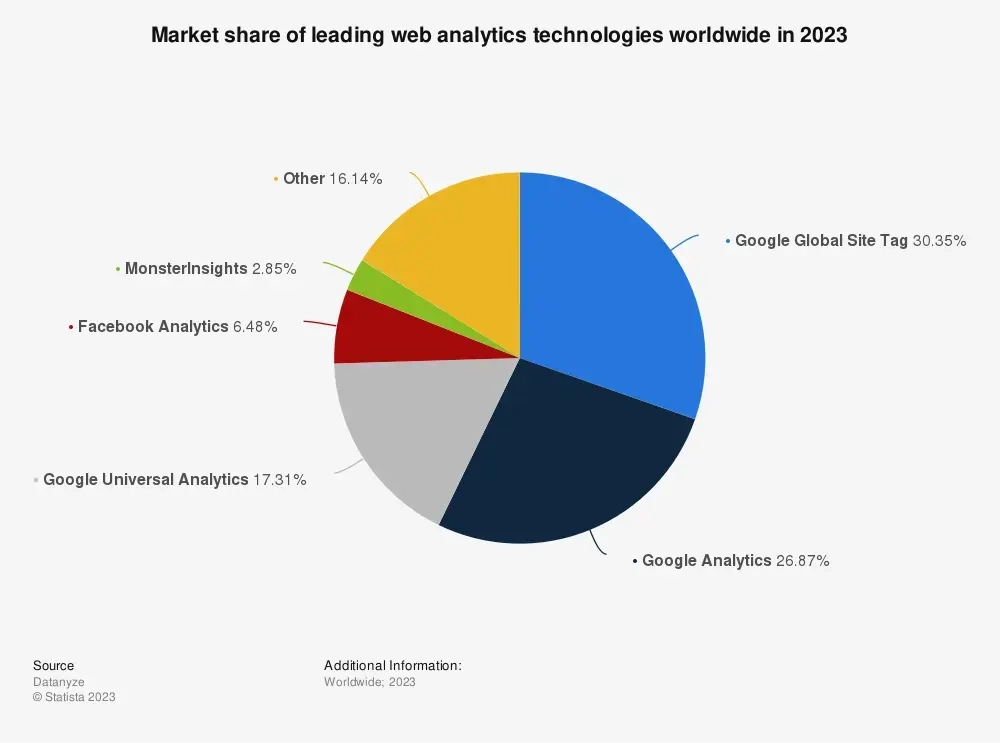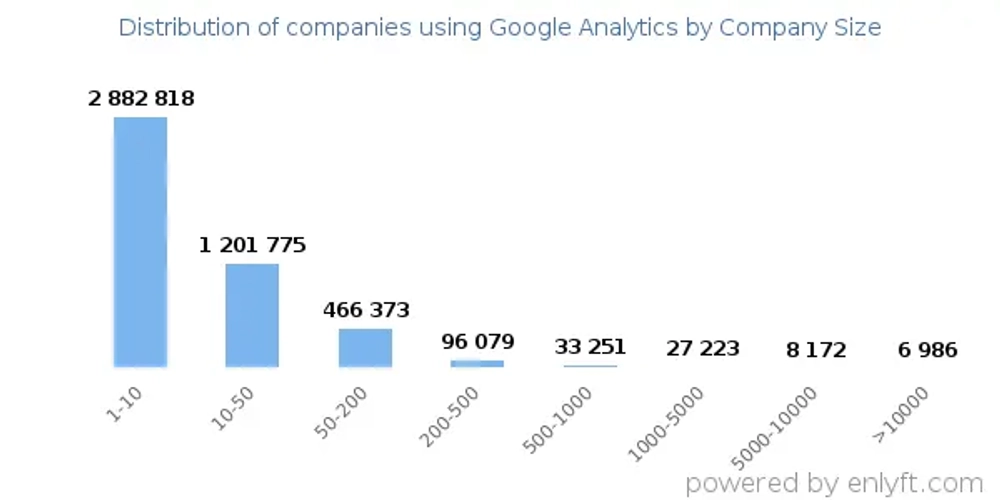15 Essential Google Analytics Statistics You Need to Know in 2026

Contents
- Google Analytics Statistics Worldwide
- Google Analytics Statistics in the UK
- Google Analytics Usage Statistics
- Google Analytics Website Statistics
- Google Analytics 4 Statistics
- Get Inspired by These Google Analytics Statistics
- Enjoyed reading these statistics? Find more statistics you need to know in 2026 here:
As a website owner, it’s only natural that you want to know more about those who visit your site.
For instance, where are they from? How are they discovering your content? What brings the most traffic? Knowing this information allows us to better understand our audience so we can create the content that will appeal to them.
Luckily, you don’t have to guess to gain answers to those questions. Instead, you just need to install a tool on your site that will gather and present this data to you. A tool like Google Analytics.
In this post, we’ve rounded up some interesting Google Analytics statistics that will show how popular this website tracking and reporting tool has become since its launch in 2005.
Google Analytics Statistics Worldwide
Now, let’s broaden our scope for a moment and take a look at some global Google Analytics statistics. This data allows us to see how widely used this tool is for tracking data, which countries rely on it the most and more. Plus, there are even some places where Google Analytics is banned! Here’s what you need to know:
1. About 37.9 Million Websites Use GA4
Although there isn’t a ton of information available about Google Analytics and its users, we do know approximately how many websites have installed this tool for tracking and collecting data.
There are about 37.9 million websites currently using Google Analytics, with 3.2 in the U.S. alone, and it’s expected that number will continue to climb in the years to come. That’s because it holds the top spot when it comes to the best web analytics tools.
2. Over 3.2 Million Websites in the U.S. Have Google Analytics 4 (GA4)
Website owners in the U.S. see the value in having Google Analytics installed for tracking data. In the U.S. alone, there are over 3.2 million websites with Google Analytics. Now, that does seem like a rather low number when you consider there are an estimated 133,361,676 websites in the U.S. However, it’s important to remember there are tons of inactive sites out there.
3. Google Analytics or Similar Tools are Used by Approximately 83.5% of All Websites
83.5% of websites utilize Google Analytics or similar tools to track the performance of their website.
4. Google Has the Largest Market Share When it Comes to Web Analytics
Google Analytics certainly isn’t the only option for tracking website data. There are other competitors available. However, it’s safe to say that Google’s favoured tool has risen to the top, easily beating out all of the competition.
Google has the largest market share when it comes to web analytics.
In 2023, Google Analytics had a market share of 26.87%. Google Universal Analytics had a market share of 17.31%. And Google Global Site Tag had a market share of 30.35%.
That means Google’s tools hold the top three spots when looking at the leading web analytics tools. Facebook Analytics and MonsterInsights come in fourth and fifth place, respectively. These tools are worth trying if you want to experiment with other options.

5. Several European Countries Have Banned Google Analytics
Although Google Analytics provides tremendous value to website owners, some countries aren’t too happy with its practices.
In 2016, the European Union adopted the General Data Protection Regulation, better known as GDPR. The intention behind GDPR was to protect the data and privacy of citizens within the European Union. It prompted many companies to rethink how they collected and stored customer data, plus they were required to ask for consent when gathering this data.
Because some countries felt Google Analytics violated the GDPR, Google Analytics was banned in France, Austria, and now Italy. Google Analytics 4 is said to address these issues to keep up with privacy laws across various countries.
As more of these laws get passed and changes are made over time, it’s important Google and other web analytics tools comply.
6. Google Analytics Launched GA4 in October 2020
In October 2020, Google launched a new updated version of Universal Analytics, GA4, which complied with the current GDPR.
Universal Analytics stopped processing data as of 1 July 2023.
7. Global Analytics as a Service Market Value is Expected to be $59 Billion by 2027
Although this piece of information isn’t about Google specifically, the company is a major player in the Analytics as a Service (AaaS) market. This market value is currently at around $19 million but is expected to increase to $68.9 million by 2028. This shows just how important analytics are to online creators.
Google Analytics Statistics in the UK
Although Google Analytics is available in many countries around the globe, we first want to take a look at some statistics about its usage in the UK. Are many website owners in the UK turning to this robust tool to collect data on their website visitors? Let’s find out.
8. The UK is in Third Place for GA4 Usage, Behind the United States and Japan
Following the United States and Japan, the United Kingdom secures the third spot in GA4 usage. Beyond, the frontrunners in the realm of Google Analytics 4 include Russia and Brazil.
Google Analytics Usage Statistics
There isn’t a ton of easily accessible information regarding who is using Google Analytics to collect data. However, we did discover a couple of interesting Google Analytics statistics regarding the companies that have this tool installed on their websites. Here’s what you should know:
9. Most of the Companies Using Google Analytics Have 1-10 Employees
Companies of all sizes rely on Google Analytics to collect data on their website and their visitors. In fact, 6,213,223 are believed to use the platform.
However, it seems the smaller companies rely on it the most.
According to data, 72% of the companies using Google Analytics are considered “small” with just 1-10 employees. So, if it’s just you using Google Analytics to manage your business website, you aren’t alone!
At least 18% of companies using Google Analytics are considered to be “medium”, and only 10% are large (with more than 1,000 employees).

10. Most Companies Using Google Analytics Have a Revenue of $1 Million-$10 Million
When looking at revenue, companies generating between $1 million and $10 million annually make up a majority of Google Analytics users.
The second largest group of Google Analytics users based on revenue are those generating between $0 to $1 Million annually. After all, even if your website doesn’t turn a profit, Google Analytics is still worth using!
Google Analytics Website Statistics
Google Analytics can be beneficial for websites from every industry. Whether you have an online store or are just managing a personal blog, web analytics provides many insights into your site’s visitors.
This information can then be used to cater to their interests and needs. Here are some website-related Google Analytics statistics you should know, including which industry uses this tool the most:

11. Retail Websites Have the Most Google Analytics Users
When looking at the type of website that most relies on Google Analytics, it’s safe to say the answer is retail. Retail websites make up around 5% of Google Analytics users.
Behind retail is the construction industry, which accounts for about 5% of Google Analytics users. Here is a list of the top industries:
Retail
Construction
Hospital & Healthcare
Information Technology & Services
Computer Software
Marketing & Advertising
Hospitality
Real Estate
Consumer Services
Financial Services
12. Marketing Is the Top Industry Using Google Analytics
Retail websites may be the ones most commonly using Google Analytics, but the marketing industry turns to this tool the most. The marketing industry claims approximately 35,463 Google Analytics customers.
Behind are digital marketing, social media, branding, design, SEO, and web design.
Google Analytics 4 Statistics
Launched in October 2020, Google Analytics 4 was designed to deliver predictive insights and offer better integration with Google Ads. Although it’s been around for some time now, not every website currently using Google Analytics is running this updated version. Take a look at this data:
13. At Least 13.3 Million Websites Are Using Google Analytics 4
It’s reported that 13.3 million websites are running Google Analytics 4.
14. United States Ranks First in GA4 Usage
The United States has more than 6.07M sites on GA4, followed by the UK with 574,270, and Brazil with 393,177.
15. For Marketers Using Google Analytics 4, The Key Metric to Watch is Total Users
Google Analytics provides organizations with much-needed insight into their website’s performance and ability to drive conversions. Most specifically, the metrics to keep an eye on are:
Total Users
New Users
Active Users
Pageviews
Sessions
Sessions per User
Acquisition Source
Engagement Rate
Average Engagement Time
Bounce Rate
Conversions
Revenue
Events
Get Inspired by These Google Analytics Statistics
When was the last time you did a deep dive into your Google Analytics? If it’s been a while, allow yourself to get inspired by these Google Analytics statistics.
Take some time to review data about your website and use that information to shape your content strategy moving forward. That data can even come in handy when developing your social media strategy.
If you want a little help scaling your business online, get in touch with The Social Shepherd to learn how we can improve your social media marketing, paid media and creative.
Enjoyed reading these statistics? Find more statistics you need to know in 2026 here:

You might also like
Don’t be sheepish
let’s talk








